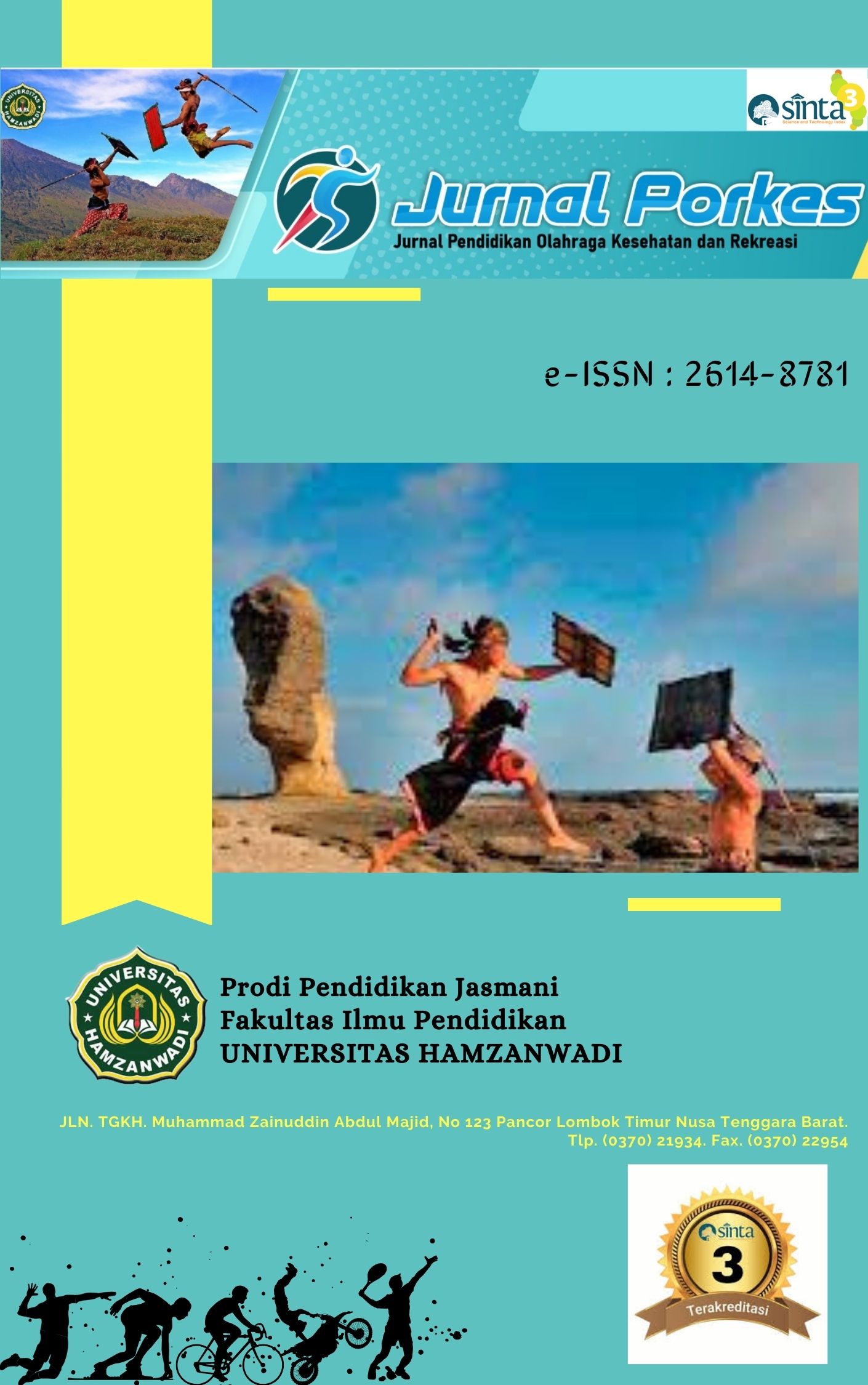Model Belajar Lompat Jauh Berbasis Bermain untuk Siswa Kelas V Sekolah Dasar
DOI:
https://doi.org/10.29408/porkes.v8i3.31978Keywords:
Learning model; long jump; play-based approach; Elementary School; R&D.Abstract
This study originated from the problem of low learning outcomes in long jump and monotonous conventional methods. An initial survey in West Bekasi District revealed that 76.54% of students had not achieved the minimum passing criteria, supported by findings that boring learning was the main cause. The purpose of this study was to develop and test the effectiveness of a play-based long jump learning model specifically designed for fifth-grade students. The method used was Research and Development (R&D) with the Borg & Gall model, which included validation by nine experts (athletics, physical education, and play experts), a small-scale trial (25 students), a large-scale trial (45 students), and an effectiveness test with a quasi-experimental design (60 students divided into experimental and control groups). The research results successfully produced 16 structured game models based on the stages of the long jump technique. Expert validation placed the product in the “very good” category (average score of 4.22). The effectiveness test showed a very significant increase in the experimental group with an N-Gain of 76.75% (effective), while the control group only had an increase of 8.13% (ineffective). In conclusion, this play-based long jump learning model has been proven to be very effective, feasible, and can be implemented as an innovative solution to improve the quality of physical education in elementary schools.
References
Alamsyah, M. E. F., Fatoni, M., Indarto, P., & Sistiasih, V. S. (2025). Penerapan Model Pembelajaran STAD untuk Meningkatkan Hasil Belajar Lompat Jauh. utile: Jurnal Kependidikan, 11(1), 36-41. https://doi.org/10.37150/h1vxv364
Borg, W. R., & Gall, M. D. (2007). Educational research: An introduction (8th ed.). Pearson Education.
Beliyawati, B., Pahrudin, A., & Rahmi, S. (2025). Model, Konsep, Desain, Pendekatan dan Model Pengembangan Kurirkulum. Sosial: Jurnal Inovasi Pendidikan IPS , 5 (2), 317-325. https://doi.org/10.51878/sosial.v5i2.5378
Deci, E. L., & Ryan, R. M. (2017). Self-Determination Theory: Basic Psychological Needs in Motivation, Development, and Wellness. Guilford Press.
Hidayat, A. S., Dlis, F., & Hanief, S. (2021). Pengembangan Model Pembelajaran Atletik Nomor Lari Berbasis Permainan pada Siswa Sekolah Dasar. Penerbit Cv. Sarnu Untung.
Hanafi, S. (2025). Pengaruh Koordinasi Motorik terhadap Teknik Lompat Jauh pada Siswa SMP. Jurnal Dunia Pendidikan, 5(6), 2534-2545. https://jurnal.stokbinaguna.ac.id/index.php/JURDIP/article/view/4167
Mujriah, M., & Susilawati, I. (2024). Efektivitas Penggunaan Model Pembelajaran Teaching Games for Understanding dalam Meningkatkan Motivasi Belajar Lompat Jauh. Jurnal Pendidikan Olahraga, 14(4), 194-199. https://ejournal.tsb.ac.id/index.php/jpo/article/view/1700
Muharram, N. A. (2015). Pengaruh pembelajaran dan kemampuan gerak Dasar Terhadap Peningkatan Kemampuan Sprint 100 Meter. Jurnal Sportif: Jurnal Penelitian Pembelajaran, 1(1), 22-31. https://doi.org/10.29407/js_unpgri.v1i1.572
Muhaimin, A., & Akhmad, N. (2020). Upaya Meningkatkan Hasil Belajar Lompat Jauh Melalui Pendekatan Bermain. Journal Sport Science, Health and Tourism of Mandalika (Jontak), 1(2), 52-57. https://doi.org/10.36312/jontak.v1i2.220
Muhaimin, A. (2019). Upaya Meningkatkan Hasil Belajar Lompat Jauh Melalui Pendekatan Bermain pada Siswa Kelas V SD Negeri 1 Kedungbanteng. Jurnal Pendidikan Jasmani Indonesia, 15(2), 89-95. https://doi.org/10.21831/jpji.v15i2.28745
Muhandis, A. M. A., & Riyadi, A. (2023). Analisis Efektivitas Customer First Quality First Approach Pada Training Quality Dojo Dengan Metode Quasi Eksperimen One Group Pretest Posttest Design: Analisis Efektivitas Customer First Quality First Approach Pada Training Quality Dojo Dengan Metode Quasi Eksperimen One Group Pretest Posttest Design. Journal of Applied Multimedia and Networking, 7(2), 98-106. https://doi.org/10.30871/jamn.v7i2.6931
Pratama, D. B., Fadly, W., & Winarno, N. (2025). Project Based Learning Berbasis Kegiatan Sains Aestetik: Tinjauan Metode Ganda Terhadap Kecemasan Belajar Siswa. Jurnal Ilmu Pendidikan dan Pembelajaran, 3(2), 56-67. https://doi.org/10.58706/jipp.v3n2.p56-67
Roehatul, A. (2025). Pembentukan Karakter pada Pembelajaran Pendidikan. Jurnal Pendidikan Dasar, Menengah & Kejuruan, 2(2), 35-40. https://artmediapub.id/index.php/JPDMK/article/view/205
Rustandi, E., & Sukriyanto, T. (2020). Pengaruh Penerapan Metode Bermain Terhadap Penguasaan Teknik Dasar Lompat Jauh Siswa Kelas VI SDN 2 Panunggul Kecamatan Gegesik Kabupaten Cirebon. Jounal Respecs, 2(2), 50-56.
Sukmadinata, N. S. (2017). Metode penelitian pendidikan. Remaja Rosdakarya.
Talahatu, L., Purwanto, E. J., & Silalahi, S. (2024). Strategi Peningkatan Kualitas Pendidik dan Tenaga Kependidikan dalam Implementasi Pembelajaran Berbasis Proyek di SMA Negeri 6 Buru. Jurnal Ilmiah Guru Madrasah, 3(2), 65-76. https://doi.org/10.69548/jigm.v3i2.26
Wahyuni, F., & Azizah, S. M. (2020). Bermain dan belajar pada anak usia dini. Al-Adabiya: Jurnal Kebudayaan dan Keagamaan, 15(01), 159-176.
https://ejournal.insuriponorogo.ac.id/index.php/adabiya/article/view/257
Downloads
Published
How to Cite
Issue
Section
License
Copyright (c) 2025 Fandhi, Samsudin, Hernawan, Sujarwo

This work is licensed under a Creative Commons Attribution-ShareAlike 4.0 International License.
![]()
Jurnal Porkes is licensed under a Creative Commons Attribution-Share Alike 4.0 International License







